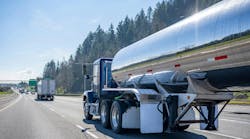Bulk intermodal operations stood out in 2008 as a top-performing sector in the US tank truck industry. Both tank container and transloading activity reportedly held up well in spite of the worldwide economic slowdown.
In fact, overall domestic US intermodal operations posted their best results in four years, according to Intermodal Market Trends & Statistics, which is published by the Intermodal Association of America. Domestic intermodal activity grew by about 4.7% during 2008, while international intermodal traffic fell by about 1.6%.
US companies that handle tank containers benefited from both domestic and international shipments. For instance, Boasso America Corporation, a subsidiary of Quality Distribution Inc, recently opened a new full-service tank container depot in Newark, New Jersey. The $6-million depot is the first of a number of new facilities planned by Boasso America over the next 36 months. The company also plans to build a new tank container maintenance and repair shop at its depot in Savannah, Georgia.
John Montague launched a new tank container drayage operation February 2008 in Charleston, South Carolina. The business is off to a good start, and he's already looking at the feasibility of opening a depot with container storage, repair, and testing capabilities.
PSC Container Services also focused on the Charleston area, opening a new wash rack to serve the tank container market. PSC officials point out that the longterm economic outlook suggests that tank container activity will continue to grow once the overall economy recovers from the current downturn.
After all, US-China shipping trade grew by almost 1500% from 1989 to 2006. One recession will not put an end to that. The Charleston area — and the tank container operators serving that market — are benefiting from a shift in trade routes from congested West Coast ports to facilities in the US Southeast. That shift will be facilitated by a widening of the Panama Canal.
The future looks even better for the transloading sector. For instance, Superior Bulk Logistics' SuperFlo transloading service outpaced the corporation's tank truck operations over the past year. Transloading service under the SuperFlo banner may continue to outperform trucking during 2009.
Gary W Watt, Superior Bulk Logistics (SBL) senior vice-president and chief marketing officer, says in Bulk Transporter's December cover story that transloading and other multimodal services are doing well because they offer shippers a number of options for reining in transportation and distribution costs.
“Our SuperFlo operations are still doing well despite the soft economy,” Watt says. “We've seen no significant falloff in demand, and transload activity is growing faster than truck freight right now.”
SBL will continue to add more transload facilities in coming years. The company has targeted a wide range of products — including foods, chemicals, and plastics — with its transloading operations. “I wouldn't be surprised if we open as many as five new locations in the next three years,” Watt says.
Among transload operations, some of the fastest growth is coming at facilities that handle renewable fuels, such as ethanol and biodiesel. A number of the transload facilities that opened over the past couple of years have specialized in these products. Existing terminals are being upgraded for renewable fuels.
Manly Terminal LLC in Manly, Iowa, is just one of a multitude of transload terminals built primarily to serve the biofuels market. The state-of-the-art terminal is part of a partnership between Kenan Advantage Group (KAG), Sabin Group, and the Kiewiet family. KAG is developing additional ethanol transload facilities in other parts of the United States.
“We believe the renewable fuels market will move well beyond the 36 billion gallons mark set for 2022,” says Dennis Nash, KAG president and chief executive officer. “We are convinced that this will be a big industry. This is just the beginning of a massive increase in renewable fuels.”
Others share Nash's view. Dedicated ethanol transload terminals were opened in the Dallas-Fort Worth (Texas) area; Atlanta, Georgia; Baltimore, Maryland; and other major population centers during the past year. More are under development.
One thing that distinguishes these and other new transload terminals is that most are being designed to accommodate unit trains consisting of 50 to 100 railcars. Many new transload facilities are being built as multimodal operations with storage tank, warehousing, and packaging and blending services.
Clearly, the intermodal side of the tank truck industry did well during the past year. All indications are that it will continue to be a vibrant part of the industry.








